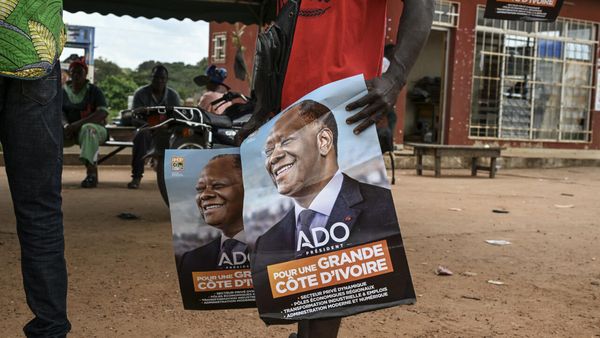
Perhaps the greatest tribute you can pay to Noah Lyles is that he really is as good as he says he is. First comes the vision. Then comes the pledge, almost as if he is trying to speak the vision into reality. Finally the delivery, the nuts and screws of cashing the cheques his words have already written for him. And in about the time it takes you to read this paragraph, he becomes the Olympic 100m champion.
The new undisputed king of men’s sprinting is a kind of tortured genius, a manga and anime fan who likes painting his nails and his skateboards, who mentioned his therapist in his press conference, who understands better than most that the glory and the despair are basically two halves of a whole. Perhaps nothing captures this better than a final won by five-thousandths of a second, the breathtakingly cruel difference between Lyles and Kishane Thompson of Jamaica.
It was one hell of a fight, which is just as well because there is nothing Lyles likes better. In a sport of pure air and clean straight lines, perhaps the simplest sport of all, Lyles thrives on the thrust of conflict, the fast-twitch muscles of competition and confrontation, the salt of his haters’ tears and the salt of his own. Often it is said of athletes that the first yard is in their head. With Lyles, it is more accurate to say that the first yard is in his mouth.
He has, for example, insisted all season on calling himself the “fastest man in the world” even though Thompson has run what remains the fastest time this year; who calls out pretty much the entire NFL and NBA for having the temerity to call themselves world champions. Who described himself before the last Games as the three-time Olympic gold medallist and made it his phone screensaver, shortly before leaving Tokyo with a grand total of one bronze medal.
What changed? Perhaps we discovered this a few seconds into the final. He had already been edged out by Oblique Seville of Jamaica in the semi-final and Louie Hinchliffe of Great Britain in his first-round heat.
Whatever aura he still possessed from his clean sweep at the world championships in Budapest 12 months ago, let’s just say it wasn’t entirely evident 40 metres into the race, with Lyles dead last and Thompson ominously taking to the front.
Thompson is 23 and yet, until this still-warm Paris evening, remained something of an unknown quantity. A product of the famous MVP club in Kingston, his coach Stephen Francis has made a very conspicuous show of holding him back, keeping his talent under wraps like a Formula One prototype. After running 9.92sec in the heats of last year’s national championships, Francis withdrew him before the final. At other times, he has ordered Thompson to ease up after 60 metres which – in hindsight – might not have been the greatest idea.
Because at around 50m, the point at which Thompson is usually springing the knees high and opening out into his devastating drive phase, something began to malfunction. His head began to sway from side to side, the arms hanging a little loosely. In the biggest race of his life, in his first major championship, in a moment of stress few of us can imagine, Thompson was wobbling.
And perhaps this, ultimately, is where those five-thousandths of a second can be found. Lyles has seen things. He has known the pain of defeat, the numbness of depression, the sting of rejection, even humiliation, and come out the other side. More importantly, this is a technique tweaked and honed in miniaturised detail with his coach Lance Brauman, a mindset forged in long and often difficult therapy sessions.
The arm strokes were perfectly clean, the head in absolute stillness, and his mind presumably in a similar state. Lyles ate up those final few metres, and then the final few centimetres, some deep competitive urge that simply would not allow him to be beaten. A pregnant pause. The eyes of the world on a little blue screen. Then the verdict. A scream from Lyles, followed by a tear down the back straight, chased by dozens of photographers, the biggest athletic mismatch of the night.
What happens next is anyone’s guess. Men’s 100m champions from Jesse Owens to Usain Bolt have always been required to represent something larger than themselves, to be not just a champion but a figurehead, a polestar, a physical ideal and a relentless personal brand upon which tickets, hospitality packages and household items can reliably be sold.
This was a task too far for the defending champion Marcell Jacobs. Perhaps it came a little soon for Thompson too, an athlete still discovering the outer limits of himself, and who will have learned so much.
For Lyles, on the other hand, this is the role he always dreamed for himself. Through the tainted and confusing post-Bolt years, the brief interregnums of Justin Gatlin and Kerley, Jacobs and Christian Coleman, athletics has been searching – not without a certain internal contradiction – for a successor to its freakish once-in-a-generation sprinting god.
And as the achievement began to dawn on him, Lyles began to slow a little. He stopped leaping and gurning for the cameras. He looked up at the stands and for a few seconds he fell completely silent, with all the solemnity of a man who has kept a sacred promise.







